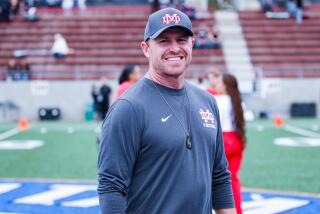Rubio Spurns Offer to Coach CSUN Women : College volleyball: Former Matador player and assistant decides to remain at Arizona.
- Share via
Dave Rubio decided home is not where his heart is.
Rubio, who grew up within miles of Cal State Northridge and is a graduate of the school, said Thursday he turned down an offer to coach the Matador women’s volleyball team.
His rejection forces Northridge to choose from assistant coaches Kelley Sliva of USC and Mora Kanim of Michigan, the remaining candidates.
Denise Corlett, top assistant for national champion Stanford, withdrew her name from consideration Monday. Corlett said “previous commitments” would prohibit her from devoting the time she would need to settle in at Northridge.
Judith Brame, associate athletic director, said Northridge was pursuing its second choice. She declined to comment further.
Former Coach Walt Ker resigned in January, citing family considerations. However, a university committee had received written complaints of sexual harassment against Ker from two members of Northridge’s 1992 team.
Rubio, saying he was “flattered” by Northridge’s offer, chose to stay at Arizona, where he hopes to build the Wildcats into a contender for a national title.
“It came down to me feeling like if I left Arizona after only one year I might later regret that decision,” Rubio said. “As far as my personal happiness goes, that would be immediate at Northridge.”
Arizona, 4-26 and winless in Pacific-10 Conference matches in 1991, improved to 10-17 with four conference victories last fall, in Rubio’s first season.
Before moving to Arizona, Rubio spent five years at Bakersfield, where he compiled a 120-65 record and won an NCAA Division II national championship in 1989.
Rubio said Northridge’s salary offer, believed to be in the $60,000 range, was far more than what Arizona will pay him.
Rubio’s ties to the school and the Northridge area are strong. He played volleyball at Northridge and was an assistant to Ker for the Matador men’s team in 1983 and the women’s team in 1985.
“It was a very, very difficult decision,” he said. “I could argue both sides and give a convincing argument for either side. What it came down to was instinct, a gut feeling.”
More to Read
Get our high school sports newsletter
Prep Rally is devoted to the SoCal high school sports experience, bringing you scores, stories and a behind-the-scenes look at what makes prep sports so popular.
You may occasionally receive promotional content from the Los Angeles Times.







